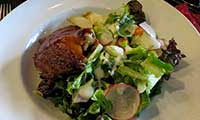
For many individuals, eating out at restaurants is often a pleasurable experience. Many people often enjoy taking a break from their normal routine or eating habits to try new foods, revisit favorite meals, experience a new ambiance and connect with loved ones over a meal.
Restaurants Can Be Triggers
However, for a person who is recovering from a food addiction, eating out at restaurants can be extremely triggering, overwhelming, and challenging. If you or a loved one has been dealing with a food addiction, what are some effective strategies for renegotiating the meal time experience at a restaurant?
While it may be easier to avoid eating out at restaurants completely, this is not an entirely realistic option. Eating out at restaurants is something that is often encountered, whether for business or casual experiences, and learning how to work through a situation rather than avoiding may be more therapeutic.

Before understanding ways to renegotiate the restaurant experience, it is important to understand potential triggers as well as develop healthy and appropriate coping mechanisms.
The restaurant environment for several different reasons may trigger a person who is struggling with a food addiction. For example, many restaurants offer a plethora of food choices, ranging from appetizers to main courses to desserts and more.
A food addict may have been accustomed to ordering several items for sheer emotional reasons or may have avoided eating certain things in particular. The number of options can be quite overwhelming, and deciphering what to eat can be challenging for the individual recovering from a food addiction.
Meal Portions
Another aspect that may be challenging for the recovering food addict is the portion of the meal or the means by which the meal is delivered and served. For example, many restaurants typically offer abnormally large portion sizes of meals which may be much more than what a person might need to consume in one sitting.

A food addict may be habituated with eating an entire quantity of their meal regardless of whether or not they are physically hungry or full. Revisiting restaurants while in recovery from a food addiction may mean learning how to deal with large portion sizes and appropriately regulate intake according to the body’s physical cues.
Restaurants that offer appetizers before meals or things such as a breadbasket, basket of chips on the table, etc. may also be difficult for an individual to regulate.
Have Eating Plan Ready
Working through these potential scenarios beforehand is important in food addiction recovery, and a person does not need to approach these types of challenging situations alone. A registered dietitian and therapist/counselor who specialize in food addiction can help a recovering food addict navigate their way through the restaurant scene as well as other types of situations that may present challenges.
 Perhaps one of the most important concepts to learn and understand in recovery from a food addiction is the difference between physical and emotional hunger. Many individuals may be accustomed to dealing with their feelings by eating, which can leave them feeling worse and with unresolved emotions.
Perhaps one of the most important concepts to learn and understand in recovery from a food addiction is the difference between physical and emotional hunger. Many individuals may be accustomed to dealing with their feelings by eating, which can leave them feeling worse and with unresolved emotions.
While there may be temporary pleasure created by the experience of eating or from consuming certain foods, emotional distress is never masked or appropriately dealt with in this manner.
Developing and strengthening healthier coping mechanisms can also be helpful in taking the power away from food and normalizing eating all together. Working with a therapist can be helpful as well as working through behavioral therapies that teach appropriate coping skills. This is also an important step towards breaking free from a food addiction.
Learning to eat out at restaurants can be challenging while in recovery from a food addiction but is something that can successfully approached with the right guidance, support, and tools. Working with a treatment team, learning about yourself and potential triggers, and exercising healthy coping mechanisms can help you renegotiate the experience of eating out at restaurants.

About the Author: Crystal is a Masters-level Registered Dietitian Nutritionist (RDN) with a specialty focus in eating disorders, maternal/child health and wellness, and intuitive eating. Combining clinical experience with a love of social media and writing, Crystal serves as the Special Projects Coordinator for Eating Disorder Hope/Addiction Hope, where her passion to help others find recovery and healing is integrated into each part of her work.
As a Certified Intuitive Eating Counselor, Crystal has dedicated her career to helping others establish a healthy relationship with food and body through her work with EDH/AH and nutrition private practice.
The opinions and views of our guest contributors are shared to provide a broad perspective of addictions. These are not necessarily the views of Addiction Hope, but an effort to offer discussion of various issues by different concerned individuals.
We at Addiction Hope understand that addictions result from a combination of environmental and genetic factors. If you or a loved one are suffering from an addiction, please know that there is hope for you, and seek immediate professional help.
Reviewed By: Jacquelyn Ekern, MS, LPC on February 19, 2016
Published on AddictionHope.com

